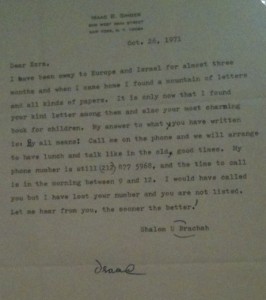If you’ll be in New York before January 29, you must stop by the Jewish Museum and take a walk through a wonderful exhibition, “The Snowy Day and the Art of Ezra Jack Keats.”
When I first heard about this exhibition a few months ago, the very title evoked a pleasing memory. I visualized Peter, the child protagonist of The Snowy Day, as he appeared on the pages of the book before me in my kindergarten classroom in Brooklyn oh-so-many years ago. I remembered the book’s sheer beauty, its vivid colors and the magical way—still astonishing to me as a young reader, still astonishing now—that it captured the very same sense of wonder that I, too, experienced on snowy days.
Visiting the exhibition this past weekend, I recaptured some of that wonder.
But I have learned so much more about Keats’s life and work. For starters, the exhibition reveals that Keats was the son of impoverished Eastern European Jewish immigrants. He was born in Brooklyn—as Jacob Ezra Katz.
This weekend, I was awed anew by his (largely self-cultivated) artistic talent. Moreover, thanks to an exhibit-within-the-exhibit (“From Sambo to Stevie: African-Americans in Picture Books”), I learned a lot that I hadn’t fully appreciated about Keats’s contribution to the history of multicultural children’s literature (and about that subject more broadly).
 Again, I urge you to spend some time at the Jewish Museum exploring the exhibition for yourself. But if that isn’t possible, you can get a substantial glimpse into this remarkable cultural offering online. However, here’s one item that I don’t believe you’ll find online: this sweet and friendly letter from Isaac Bashevis Singer to Ezra Jack Keats. (Please accept my apologies for the quality of my iPhone photo. I’ll confess that I was a bit verklempt in the moment, too!)
Again, I urge you to spend some time at the Jewish Museum exploring the exhibition for yourself. But if that isn’t possible, you can get a substantial glimpse into this remarkable cultural offering online. However, here’s one item that I don’t believe you’ll find online: this sweet and friendly letter from Isaac Bashevis Singer to Ezra Jack Keats. (Please accept my apologies for the quality of my iPhone photo. I’ll confess that I was a bit verklempt in the moment, too!)
P.S. If I haven’t sufficiently swayed you, please read this take on the exhibition from The New York Times. That should do it!
